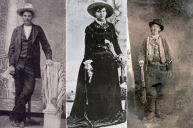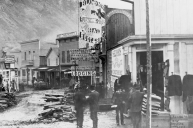In the annals of American history, few organizations have managed to capture the imagination and evoke a sense of both intrigue and apprehension quite like the Pinkerton Detective Agency. This legendary agency, shrouded in mystery, has left an indelible mark on the nation's past, serving as both champions of justice and controversial enforcers of corporate interests.
Origins of the Pinkerton National Detective Agency
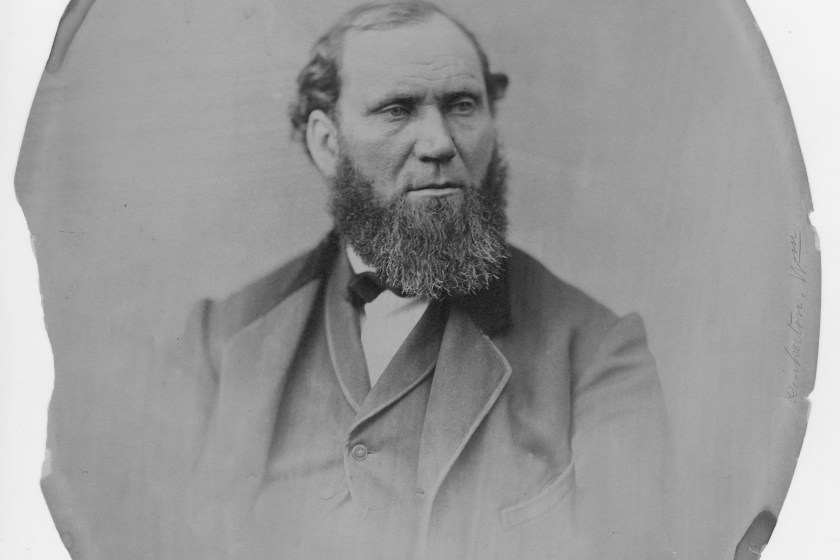
Portrait of Allan Pinkerton, 1860. (Photo by Chicago History Museum/Getty Images)
The origins of the Pinkerton Detective Agency are as modest as they are remarkable, beginning with Allan Pinkerton's emigration from Scotland to the United States in 1842. After settling in Dundee, Illinois, northwest of the bustling city of Chicago, Pinkerton established himself as a cooper, skillfully crafting barrels that were essential in the storage and transportation of goods during that period. It was a chance discovery, however, that pivoted his path from barrel-making to law enforcement. While foraging for wood on an uninhabited island, Pinkerton stumbled upon a hidden den of counterfeiters. His successful collaboration with the local sheriff to apprehend these criminals marked the inception of his investigative career.
This fortuitous encounter unveiled Pinkerton's natural knack for detective work, leading him to assume the role of Cook County's first detective and, later, a special agent for the U.S. Post Office. His reputation for tenacity and integrity grew; and by 1850, alongside Chicago attorney Edward Rucker, he laid the groundwork for the North-Western Police Agency. This enterprise, which began in a small Chicago office, would later expand and rebrand as the Pinkerton National Detective Agency.
The Pinkertons Spied for the Union Army during the Civil War
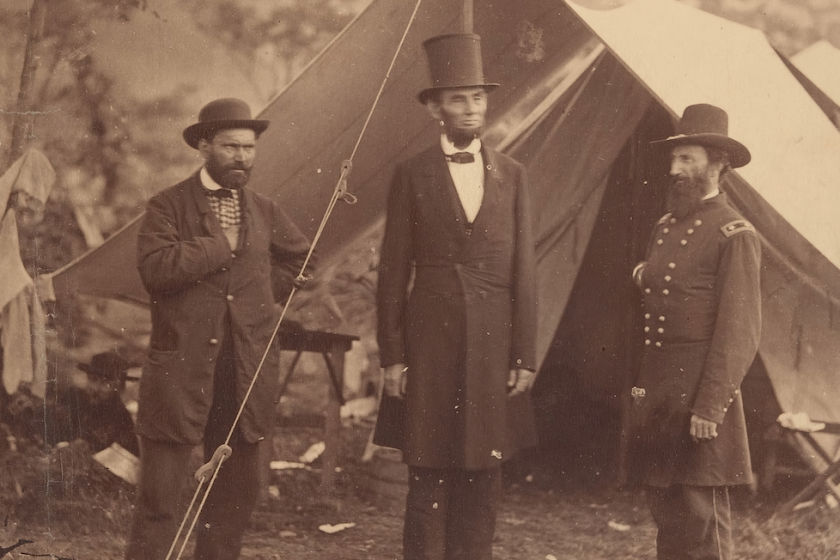
President Abraham Lincoln, Maj. Gen. John A. McClernand (right) and E.J. Allen (Allan Pinkerton) (left), chief of the Secret Service of the United States, at Secret Service Department, headquarters for the Army of the Potomac, near Antietam, Maryland, Oct. 3, 1862. (Artist Alexander Gardner) (Photo by Heritage Art/Heritage Images via Getty Images)
During the turbulent years of the Civil War, the Pinkerton Detective Agency was catapulted onto the national stage, playing a crucial role in the conflict that would define America's future. Allan Pinkerton, the agency's founder, was appointed as the head of the Union Intelligence Service, later known as the Secret Service. Under his steely direction, the Pinkertons became an invaluable asset to the Union's war efforts, particularly to Maj. Gen. George B. McClellan, the commander of the Army of the Potomac.
Pinkerton himself, under the alias Major E.J. Allen, undertook perilous undercover missions behind enemy lines. His agents infiltrated the highest ranks of the Confederate military and society, collecting vital intelligence on troop movements, battle plans and fortifications. They operated in a world where the slightest misstep could lead to their exposure and execution, but their work was instrumental in shaping the Union's strategic decisions.
However, the Pinkertons' contributions to wartime intelligence were not without controversy. Their estimates of Confederate strength were often grossly exaggerated, leading to overcautious Union tactics. The most notable instance of this was prior to the Battle of Antietam, where Pinkerton's inflated numbers contributed to McClellan's hesitation to attack, potentially prolonging the war.
Despite such missteps, the Pinkerton Agency's wartime efforts marked a significant chapter in the field of intelligence. Their pioneering techniques in espionage and counterespionage set precedents that would influence intelligence gathering methods long after the cannons fell silent.
The Pinkertons Waged War Against Frank and Jesse James
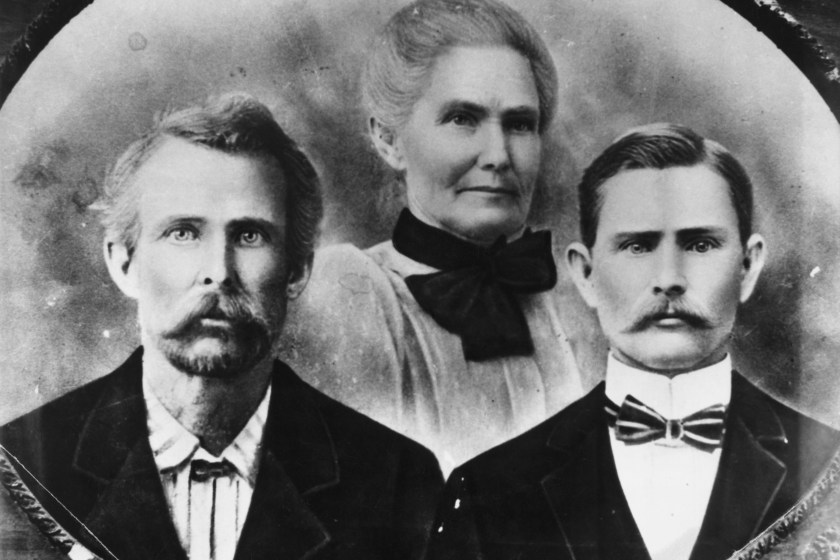
Jesse (left) and Frank James, backed by their mother, Zerelda Samuel, formerly the Widow James. (Photo by Bettman via Getty Images)
The Pinkerton Detective Agency, renowned for its wartime espionage, also earned infamy in the post-Civil War era as relentless trackers of America's most wanted. Among their targets, none were as elusive or as legendary as the James brothers, Frank and Jesse. The agency's pursuit of these infamous outlaws is a tale of determination met with frustration, a rare blemish on the Pinkertons' record of success.
In the mid-1870s, the Pinkerton Agency was contracted by several railroad companies and express firms that were frequent victims of the James-Younger gang's robberies. The agency, led by Allan Pinkerton, set out to capture the outlaws with a zeal that matched the notoriety of their quarry. The Pinkertons employed a variety of methods in their pursuit, from traditional tracking to the infiltration of the brothers' social circles, hoping to gather intelligence on their whereabouts and plans.
However, the campaign against the James brothers was marked by misfortune and controversy. In an attempt to ambush Jesse James at his family home, the Pinkertons threw an incendiary device into the homestead, which resulted in the death of James' young half-brother and severe injury to their mother, who lost her arm. This tragic outcome only fueled public sympathy for the James brothers and turned many against the Pinkertons, who were seen as overzealous in their methods.
Despite numerous close calls and an extensive manhunt that spanned several states, Frank and Jesse James evaded capture by the Pinkertons. The James brothers were adept at using the terrain to their advantage, often disappearing into the network of sympathetic supporters in the rural Midwest. The Pinkertons' failure to apprehend the James brothers was a testament to the outlaws' cunning and the limitations of even the most sophisticated detective work of the era.
Ultimately, Jesse James was betrayed and killed by a member of his own gang, Robert Ford, in 1882. Frank James surrendered to authorities shortly thereafter, leading to trials that did not result in convictions for the remaining robberies.
The Pinkertons Hired the Nation's First Female Detective
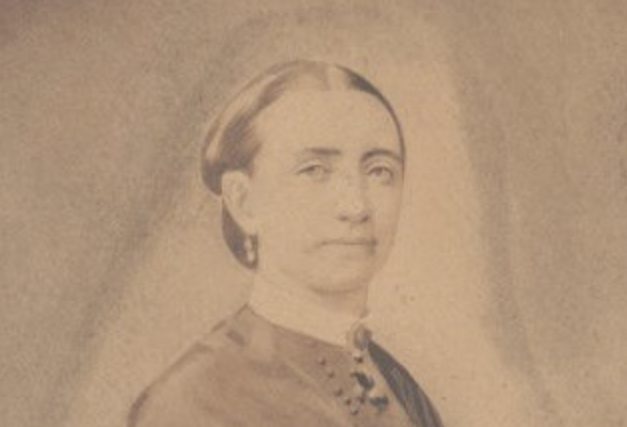
A watercolor portrait of Kate Warne in 1866. (Photo by unknown via Chicago History Museum/Wikimedia Commons)
Kate Warne's hiring by Allan Pinkerton in 1856 was not merely a notable achievement in the Pinkerton Detective Agency's history; it also was a groundbreaking moment in the annals of American law enforcement. As the nation's first female detective, Warne's entry into the male-dominated field of investigation was unprecedented. Her skill set proved invaluable, and she quickly distinguished herself as a key asset to the agency's operations.
Warne was a master of undercover work, employing a range of clever disguises and assuming multiple identities with ease. Her ability to infiltrate social circles and gather critical intelligence while remaining undetected was unmatched. It was these very skills that placed her at the center of one of the Pinkerton Agency's most high-stakes operations: the safe passage of President-elect Abraham Lincoln to Washington, D.C., for his inauguration amid assassination threats.
In this perilous mission, Warne showcased her ingenuity and tactical acumen. She orchestrated a covert operation involving a secret midnight train journey, employing various subterfuges to shield Lincoln from potential assailants. Warne even posed as Lincoln's sister, helping to divert attention and ensure his unscathed arrival in the capital. This successful operation not only thwarted a national crisis but also cemented the Pinkerton Agency's reputation for vigilance and effectiveness.
The Pinkertons Created the World's First Criminal Database
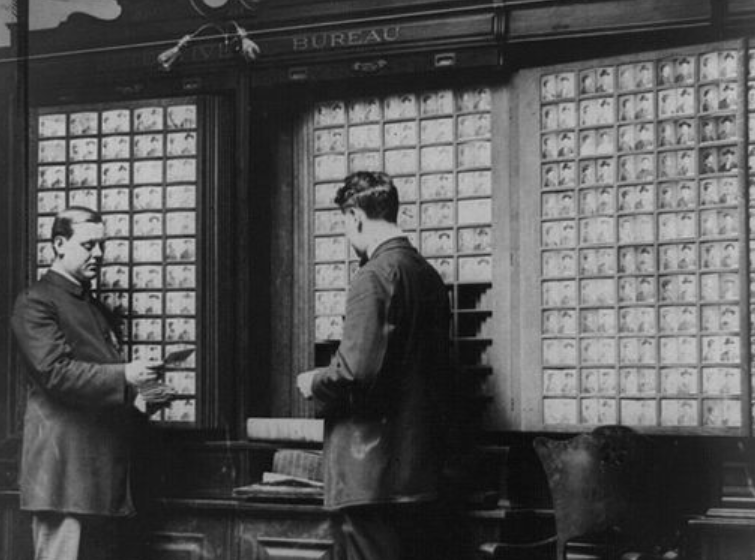
N.Y. Police, Rogues' Gallery, July 1909. (Photo by United States Library of Congress' Prints and Photographs division/Wikimedia Commons)
Under the visionary guidance of Allan Pinkerton, the agency began compiling an extensive collection of criminal records that was unprecedented in its scope and detail. This early database was known as the "Rogues' Gallery."
The Rogues' Gallery consisted of an array of mug shots, detailed physical descriptions, known aliases, associates, methods of operation, and areas frequently operated in by the criminals. This information was meticulously collected through the agency's vast network of operatives and informants, and through cooperation with law enforcement entities across the nation.
This groundbreaking system effectively became the forerunner to modern databases such as the FBI's National Crime Information Center (NCIC). The Pinkertons' foresight in creating such a resource demonstrated an understanding of the power of information long before the digital age.
The Pinkertons Had a Controversial Role in the 1892 Homestead Mill Strike
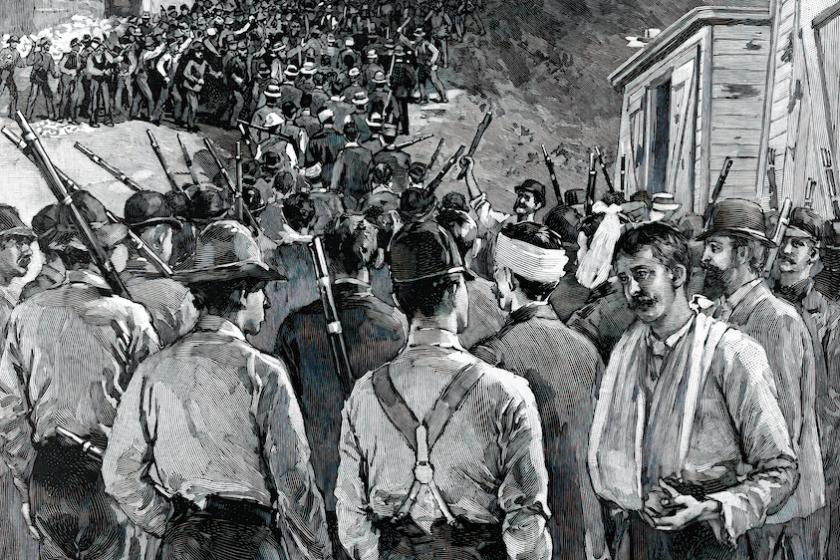
A vintage engraving depicts the Homestead Mill Strike, also called the Homestead Riot, a violent labor dispute between the Carnegie Steel Co. and many of its workers that occurred on July 6, 1892, in Homestead, Pennsylvania. (Photo by Keith Lance/Getty Images)
However, the agency's history is not without controversy. The Pinkertons found themselves embroiled in one of the bloodiest labor conflicts of the 19th century, the 1892 Homestead Mill Strike. Hired by steel magnate Andrew Carnegie, the Pinkertons clashed with striking workers, resulting in a deadly confrontation that left many dead and wounded. This episode tarnished their image and led to a national outcry.
The Pinkertons' involvement in strikebreaking and espionage for corporate interests garnered them a reputation as enemies of American labor. The controversy surrounding their activities reached its peak during the late 19th and early 20th centuries, ultimately leading to the passage of the Anti-Pinkerton Act in 1893. This act restricted the government from employing Pinkerton agents, severely limiting their government-related work.
The Pinkertons Today

Pinkerton.com
Despite its tumultuous history, the Pinkerton Detective Agency endures in the modern age. While it formally ended anti-union work in the 1930s, it diversified its services into cybersecurity, corporate risk management and threat intelligence as a subsidiary of the Swedish corporation Securitas AB.
The agency continues to generate plenty of controversy, however. In 2020, it was revealed that Amazon had hired the Pinkertons to gather intelligence on warehouse workers in Europe, particularly concerning unionization efforts. This sparked widespread debate and criticism, echoing the agency's historical role in labor disputes and raising questions about privacy and corporate surveillance in the digital age.


